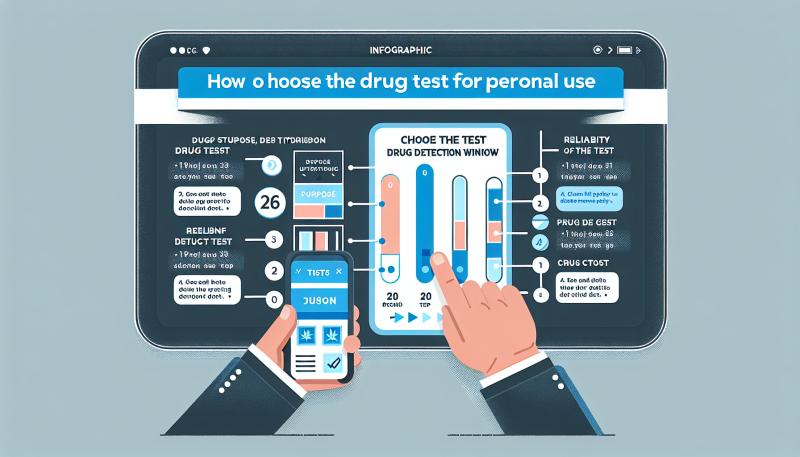
How to Choose the Right Drug Test for Personal Use
In recent years, the need for drug testing has become more prevalent not only in workplaces but also for personal use. With the vast array of drug tests available on the market, it can be overwhelming to choose the right one. Whether you are looking to monitor your own substance intake or are a parent concerned about your child's usage, selecting the appropriate drug test is crucial. This guide will take you through important factors to consider when choosing a drug test for personal use, ensuring you make an informed decision.
1. Understand the Types of Drug Tests Available
Before making a decision, it's essential to understand the various types of drug tests available. Each type offers unique benefits and limitations, making them suitable for different situations:
- Urine Tests: Urine tests are the most common and are known for their long detection window. They can identify a wide range of substances but are susceptible to tampering if not supervised.
- Saliva Tests: Saliva tests are less invasive, easier to administer, and offer a shorter detection window, usually up to 72 hours. They are popular for detecting recent drug use.
- Hair Tests: These tests can detect drug use over a more extended period, up to 90 days. However, they are more expensive and may not be appropriate for detecting recent use.
- Blood Tests: Blood tests are the most accurate but are invasive and expensive. They are typically used in clinical settings rather than at home.
- Breath Tests: Primarily used for detecting alcohol, these tests are quick and non-invasive but offer limited drug range detection.
2. Identify the Substances You Need to Test For
When selecting a drug test, it's crucial to know which substances you need to detect. Here are common panels available:
- 5-Panel Test: It typically screens for marijuana, cocaine, amphetamines, opiates, and PCP.
- 10-Panel Test: This includes all substances in the 5-panel test plus barbiturates, benzodiazepines, methadone, methaqualone, and propoxyphene.
- Expanded Panel Tests: Some tests can also detect additional substances like hallucinogens, inhalants, and synthetic drugs.
Understanding the substances you need to detect helps in narrowing down the type of test you require.
3. Evaluate the Detection Window
The detection window refers to the time period during which the drug can be detected in the body. Consider your specific needs:
- Recent Use: If you want to detect drugs used within the last few hours or days, saliva or blood tests are ideal.
- Long-Term Use: For monitoring drug use over several weeks or months, hair tests provide a longer detection window.
It's important to match the test's detection window with your testing requirements.
4. Consider the Testing Environment
Your choice of drug test could also be influenced by where and how you plan to conduct the test:
- At Home: For convenience, choose tests that are easy to administer with simple instructions, such as saliva or urine tests.
- Clinical Setting: Blood or hair tests often require professional administration and are better suited to clinical environments due to their complexity.
5. Check for Certification and Accuracy
Accuracy is fundamental when it comes to drug testing. Look for tests that have been certified by reputable organizations, such as the Food and Drug Administration (FDA) or adhere to SAMHSA guidelines. Certification ensures that the test has met specific accuracy and reliability standards.
6. Review the Cost and Accessibility
Costs can vary significantly based on the type of test, number of panels, and brand. While some tests are readily available over the counter or online, others may require professional services. Balance the cost with the reliability of results and ease of access.
7. Understand Privacy and Legal Considerations
Considerations related to privacy and legality are also integral. Ensure that the testing process respects privacy, especially when it involves minors. Understand your regional laws regarding personal drug testing to ensure compliance and avoid potential legal issues.
8. Seek Expert Guidance
If uncertain, seeking advice from professionals like those at IMS Screening Solutions can be beneficial. They can provide insights tailored to your specific needs and offer high-quality tests for personal use.
Conclusion
Choosing the right drug test for personal use requires a careful evaluation of your specific needs, understanding the types of tests available, and considering various factors such as cost and accuracy. It's important to select a test that aligns with what you are looking to achieve, be it monitoring recent drug use or checking for long-term use. Armed with this information, you can make an educated choice that offers peace of mind and reliable results.
If you're ready to choose a drug test that fits your needs, visit IMS Screening Solutions to explore a range of options that can assist you with your personal testing requirements.
